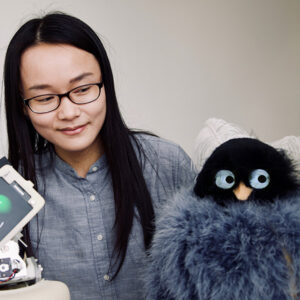Often, the impact of intelligent machines on humans is attributed to their training data, algorithms, and engineering designs. This perspective, however, overlooks the significance of design choices in these machines and the socioemotional experience of their human counterparts. Interface aesthetics and physicality, for example, play a crucial role in determining human engagement with machines and their behavior in technology-mediated social contexts.

In my research, I aim to develop a new paradigm for human-agent social interactions that prioritizes a holistic human experience and nurtures human aspirations. My work considers machines and humans as an interconnected, unified system rather than separate entities. This consideration becomes increasingly critical for the future design of artificial agents, especially in our rapidly evolving digital landscape where the boundaries between humans and machines are becoming more obscured in our everyday lives.
The foundation of my approach for next-generation human-agent interaction is built upon four key pillars: (1) Conceptual Formulation, (2) Innovative Interaction, (3) Scientific Insights, and (4) Technological Enablers. My talk will discuss several past and future projects, illustrating how interdisciplinary methods from computer science, psychology, and design are synergized to address these areas in a holistic, iterative process.
Overall, my research aims to shed light on the following questions. How can we envision a conceptual paradigm shift in social human-agent interactions from the current predominant design? How can we create agent-augmented experiences to enhance human abilities and interpersonal communication? How do agents shape human cognition, emotions, and behaviors within and after interactions? What are the necessary social capabilities for agents to effectively support human experiences in achieving their aspirations?
Huili Chen is currently a research fellow (2023-2024) at Harvard University’s Berkman Klein Center for Internet and Society and a Postdoctoral Researcher at the MIT Media Lab. She completed her Ph.D. in media arts & sciences at the MIT Media Lab in 2023, under the supervision of Prof. Cynthia Breazeal, as part of the Personal Robots Group. She earned her master’s from MIT and her B.S. in computer science and B.A. in psychology, with a minor in peace studies, from the University of Notre Dame.
As an undergraduate, she conducted research in the Complex Network Lab, advised by Prof. Tijana Milenkovic, and in the Emotive Computing Lab, under the guidance of Prof. Sidney D’Mello at Notre Dame. She also interned as an AI Research Fellow at the United Nations’ Global Pulse Initiative.
Her research focuses on designing multi-faceted human experiences augmented by socially intelligent machines, integrating approaches from computer science, psychology, and design. Her work has been published in top-tier journals and conferences in Human-Computer Interaction (HCI), human-centered computing, and other interdisciplinary fields, including IEEE Trans. Affective Computing, Computers & Education, Bioinformatics, AAMAS, HRI, UMAP, AIED, and ICMI.
She has received best paper nominations at ICMI2020 and HRI2020, and her research has been featured in MIT News, Asparagus Magazine, and the CODAME Art + Tech Festival. Huili has been honored as one of Forbes China’s 30 Under 30, an MIT Graduate Woman of Excellence, and a recipient of the Learning Innovation Fellowship at the MIT Media Lab, among other global accolades.